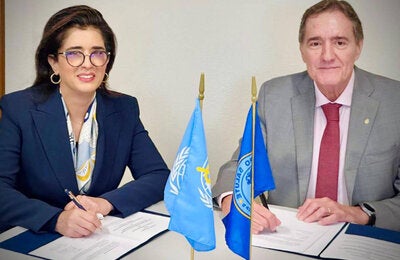Washington, D.C., 11 December 2012 — The Director of the Pan American Health Organization (PAHO), Dr. Mirta Roses Periago, today strongly welcomed the announcement by the United Nations' Secretary-General of support for efforts to eliminate cholera transmission from Haiti and the Dominican Republic.
Secretary-General Ban Ki-moon announced $23.5 million in new funds from the United Nations and $215 million in existing bilateral and multilateral funds to support the ongoing cholera elimination efforts. Just over the next two years, $500 million will be needed in Haiti alone. The announced funding will reinforce the broader "Call for Action for a Cholera-free Hispaniola" launched in January 2012 by the Presidents of Haiti and the Dominican Republic with support from the Pan American Health Organization/World Health Organization (PAHO/WHO), the United Nations Children's Fund (UNICEF), and the United States Centers for Disease Control and Prevention (CDC).
Over the next 10 years, the Cholera-free Hispaniola initiative calls for $2.2 billion in investments in water and sanitation infrastructure, health system strengthening, and health communication in Haiti, and for US$71 million for related efforts in the Dominican Republic. A detailed bi-national plan of action developed by the two governments within the initiative is scheduled to be officially launched in January 2013.
Today's announcement was made at U.N. headquarters in New York, with Prime Minister Laurent Lamothe and Minister of Health Florence Guillaume of Haiti and Minister of Health Lorenzo Wilfredo Hidalgo of the Dominican Republic in attendance. PAHO Director Roses said the U.N. support should be seen as recognition of the two governments' efforts.
"Today, we have a unique opportunity to acknowledge the months of work dedicated to eliminating cholera transmission on the island of Hispaniola by the governments of Haiti and the Dominican Republic," said Dr. Roses. "PAHO salutes Prime Minister Lamothe and President Medina and their governments for their outstanding leadership role in spearheading this initiative."
Haiti's cholera epidemic, which began in October 2010, is the largest epidemic ever recorded in a single country. More than 615,000 people in Haiti have fallen ill and more than 7,500 have died. The Dominican Republic has reported more than 28,700 cholera cases and over 450 deaths during the same time period. The majority of cases have been people living in areas without access to safe drinking water, proper sanitation, or hygiene. The Cholera-free Hispaniola initiative addresses these deficiencies with proposed investments in water and sanitation, improvements in surveillance and health care, and health communication campaigns.
Following the launch of the "Call for Action for a Cholera-Free Hispaniola" in January, PAHO/WHO, UNICEF, and CDC joined together with other organizations to form the Regional Coalition for Water and Sanitation to Eliminate Cholera Transmission in the Island of Hispaniola, for which PAHO serves as secretariat. The Coalition's role is to bring together technical expertise, raise new funds, and mobilize previously committed pledges to support the governments of Haiti and the Dominican Republic in improving access to water and sanitation and to strengthen their health systems.
In addition to PAHO/WHO, CDC, and UNICEF, the Coalition's members include the Spanish Agency for International Development Cooperation (AECID), the Inter-American Development Bank (IDB), the National Health Foundation (FUNASA) of Brazil, the Association of Haitian Medical Physicians Abroad, the Inter-American Association of Sanitary and Environmental Engineering (AIDIS), the World Bank, the Caribbean Community (CARICOM), the International Federation of Red Cross and Red Crescent Societies, WASH Advocates, Partners in Health, Veolia Environment Foundation, Zanmi Lasante, and Catholic Relief Services.
In welcoming the announced U.N. support, PAHO Director Roses said PAHO and other Coalition members "will continue to engage in advocacy efforts to underscore the message that the most important public health intervention in the island of Hispaniola is to steadily increase water and sanitation coverage together with health system strengthening."
Since the beginning of the cholera outbreak, PAHO has provided direct technical cooperation worth an estimated US$1.5 million to fight cholera in Hispaniola and has received and spent some US$ 25.3 million from other sources to support the government on cholera-related efforts.
PAHO, which celebrates its 110th anniversary this year, is the oldest international public health organization in the world. It works with its member countries to improve the health and the quality of life of the people of the Americas. It also serves as the Regional Office for the Americas of the World Health Organization (WHO) and is part of the United Nations System.



